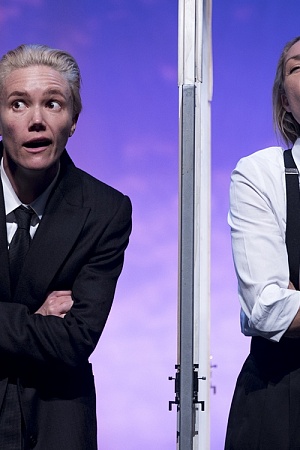Australian Realness
Australians love a bogan in pop culture. Kath & Kim broke ratings records; The Castle regularly tops lists of favourite local films. This sense of affection for the working class becomes more complex off-screen, when Aussie battlers become ‘cashed-up bogans’ and turn Queensland into a Liberal state; when they start threatening middle-class values; and especially when they gain capital and political power. Australian Realness uses the bogan stereotype as a tool to shatter the middle-class drama as both a cultural and theatrical narrative.
It’s 1997. Ansett is still in the air, the stock market is rising, and the future in North Fitzroy looks bright. There are all the trappings of a so-called ‘well-made play’: the living room set, the well-to-do family who are so recognisable they don’t even receive names, the children back home for Christmas, the secrets kept as Dad (Greg Stone), fretting over Mum’s (Linda Cropper) frivolous spending, guards the door to the shed. Son (André de Vanny) is coked to the eyeballs, and Daughter (Emily Goddard), a heavily pregnant failing artist, is squabbling with Partner (Chanella Macri), a wharfie and union rep, over whether to ask her parents for a house deposit. It is, after all, not easy to be an artist. Daughter rues her parents’ prominence (Mum is a terrible poet, Dad tours with a puppet theatre) and the fact that her old art-school friends are rising to prominence without her. Mum has framed one of Daughter’s photographs. It’s a gritty black-and-white shot of an old neighbour, ugly in the way that street photographers dream of. They can’t remember the neighbour’s name, but she’s got a great face.
Continue reading for only $10 per month. Subscribe and gain full access to Australian Book Review. Already a subscriber? Sign in. If you need assistance, feel free to contact us.















Leave a comment
If you are an ABR subscriber, you will need to sign in to post a comment.
If you have forgotten your sign in details, or if you receive an error message when trying to submit your comment, please email your comment (and the name of the article to which it relates) to ABR Comments. We will review your comment and, subject to approval, we will post it under your name.
Please note that all comments must be approved by ABR and comply with our Terms & Conditions.